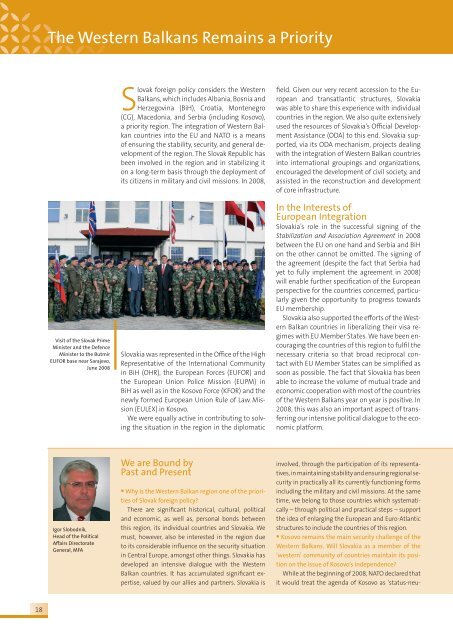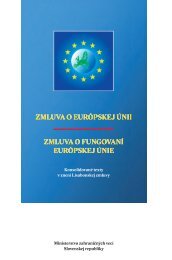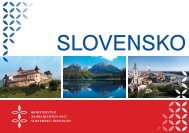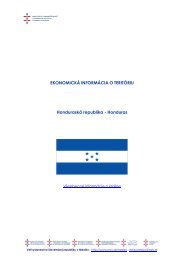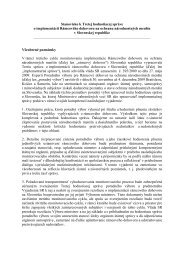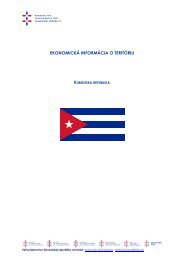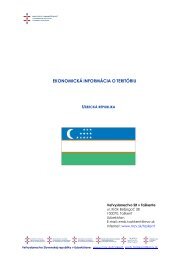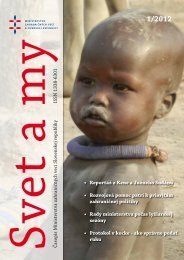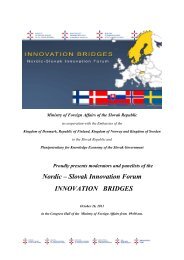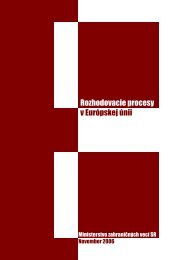Annual Report Ministry of Foreign Affairs of the Slovak Republic 2008
Annual Report Ministry of Foreign Affairs of the Slovak Republic 2008
Annual Report Ministry of Foreign Affairs of the Slovak Republic 2008
Create successful ePaper yourself
Turn your PDF publications into a flip-book with our unique Google optimized e-Paper software.
The Western Balkans Remains a Priority<br />
Visit <strong>of</strong> <strong>the</strong> <strong>Slovak</strong> Prime<br />
Minister and <strong>the</strong> Defence<br />
Minister to <strong>the</strong> Butmir<br />
EUFOR base near Sarajevo,<br />
June <strong>2008</strong><br />
<strong>Slovak</strong> foreign policy considers <strong>the</strong> Western<br />
Balkans, which includes Albania, Bosnia and<br />
Herzegovina (BiH), Croatia, Montenegro<br />
(CG), Macedonia, and Serbia (including Kosovo),<br />
a priority region. The integration <strong>of</strong> Western Balkan<br />
countries into <strong>the</strong> EU and NATO is a means<br />
<strong>of</strong> ensuring <strong>the</strong> stability, security, and general development<br />
<strong>of</strong> <strong>the</strong> region. The <strong>Slovak</strong> <strong>Republic</strong> has<br />
been involved in <strong>the</strong> region and in stabilizing it<br />
on a long-term basis through <strong>the</strong> deployment <strong>of</strong><br />
its citizens in military and civil missions. In <strong>2008</strong>,<br />
<strong>Slovak</strong>ia was represented in <strong>the</strong> Office <strong>of</strong> <strong>the</strong> High<br />
Representative <strong>of</strong> <strong>the</strong> International Community<br />
in BiH (OHR), <strong>the</strong> European Forces (EUFOR) and<br />
<strong>the</strong> European Union Police Mission (EUPM) in<br />
BiH as well as in <strong>the</strong> Kosovo Force (KFOR) and <strong>the</strong><br />
newly formed European Union Rule <strong>of</strong> Law Mission<br />
(EULEX) in Kosovo.<br />
We were equally active in contributing to solving<br />
<strong>the</strong> situation in <strong>the</strong> region in <strong>the</strong> diplomatic<br />
field. Given our very recent accession to <strong>the</strong> European<br />
and transatlantic structures, <strong>Slovak</strong>ia<br />
was able to share this experience with individual<br />
countries in <strong>the</strong> region. We also quite extensively<br />
used <strong>the</strong> resources <strong>of</strong> <strong>Slovak</strong>ia’s Official Development<br />
Assistance (ODA) to this end. <strong>Slovak</strong>ia supported,<br />
via its ODA mechanism, projects dealing<br />
with <strong>the</strong> integration <strong>of</strong> Western Balkan countries<br />
into international groupings and organizations,<br />
encouraged <strong>the</strong> development <strong>of</strong> civil society, and<br />
assisted in <strong>the</strong> reconstruction and development<br />
<strong>of</strong> core infrastructure.<br />
In <strong>the</strong> Interests <strong>of</strong><br />
European Integration<br />
<strong>Slovak</strong>ia’s role in <strong>the</strong> successful signing <strong>of</strong> <strong>the</strong><br />
Stabilization and Association Agreement in <strong>2008</strong><br />
between <strong>the</strong> EU on one hand and Serbia and BiH<br />
on <strong>the</strong> o<strong>the</strong>r cannot be omitted. The signing <strong>of</strong><br />
<strong>the</strong> agreement (despite <strong>the</strong> fact that Serbia had<br />
yet to fully implement <strong>the</strong> agreement in <strong>2008</strong>)<br />
will enable fur<strong>the</strong>r specification <strong>of</strong> <strong>the</strong> European<br />
perspective for <strong>the</strong> countries concerned, particularly<br />
given <strong>the</strong> opportunity to progress towards<br />
EU membership.<br />
<strong>Slovak</strong>ia also supported <strong>the</strong> efforts <strong>of</strong> <strong>the</strong> Western<br />
Balkan countries in liberalizing <strong>the</strong>ir visa regimes<br />
with EU Member States. We have been encouraging<br />
<strong>the</strong> countries <strong>of</strong> this region to fulfil <strong>the</strong><br />
necessary criteria so that broad reciprocal contact<br />
with EU Member States can be simplified as<br />
soon as possible. The fact that <strong>Slovak</strong>ia has been<br />
able to increase <strong>the</strong> volume <strong>of</strong> mutual trade and<br />
economic cooperation with most <strong>of</strong> <strong>the</strong> countries<br />
<strong>of</strong> <strong>the</strong> Western Balkans year on year is positive. In<br />
<strong>2008</strong>, this was also an important aspect <strong>of</strong> transferring<br />
our intensive political dialogue to <strong>the</strong> economic<br />
platform.<br />
Igor Slobodník,<br />
Head <strong>of</strong> <strong>the</strong> Political<br />
<strong>Affairs</strong> Directorate<br />
General, MFA<br />
We are Bound by<br />
Past and Present<br />
Why is <strong>the</strong> Western Balkan region one <strong>of</strong> <strong>the</strong> priorities<br />
<strong>of</strong> <strong>Slovak</strong> foreign policy?<br />
There are significant historical, cultural, political<br />
and economic, as well as, personal bonds between<br />
this region, its individual countries and <strong>Slovak</strong>ia. We<br />
must, however, also be interested in <strong>the</strong> region due<br />
to its considerable influence on <strong>the</strong> security situation<br />
in Central Europe, amongst o<strong>the</strong>r things. <strong>Slovak</strong>ia has<br />
developed an intensive dialogue with <strong>the</strong> Western<br />
Balkan countries. It has accumulated significant expertise,<br />
valued by our allies and partners. <strong>Slovak</strong>ia is<br />
involved, through <strong>the</strong> participation <strong>of</strong> its representatives,<br />
in maintaining stability and ensuring regional security<br />
in practically all its currently functioning forms<br />
including <strong>the</strong> military and civil missions. At <strong>the</strong> same<br />
time, we belong to those countries which systematically<br />
– through political and practical steps – support<br />
<strong>the</strong> idea <strong>of</strong> enlarging <strong>the</strong> European and Euro-Atlantic<br />
structures to include <strong>the</strong> countries <strong>of</strong> this region.<br />
Kosovo remains <strong>the</strong> main security challenge <strong>of</strong> <strong>the</strong><br />
Western Balkans. Will <strong>Slovak</strong>ia as a member <strong>of</strong> <strong>the</strong><br />
‘western’ community <strong>of</strong> countries maintain its position<br />
on <strong>the</strong> issue <strong>of</strong> Kosovo’s independence?<br />
While at <strong>the</strong> beginning <strong>of</strong> <strong>2008</strong>, NATO declared that<br />
it would treat <strong>the</strong> agenda <strong>of</strong> Kosovo as ‘status-neu-<br />
18


